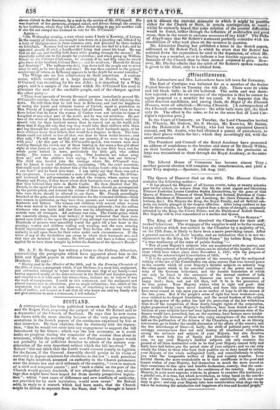SCOTLAND.
A correspondence has been published between the Duke of Argyll and Sir Robert Peel, respecting the purport of what Sir Robert said to a deputation of the Church of Scotland. He says that he now states his views with the more alacrity because of the very gross misrepre- sentations in the Scotch papers of the sentiments expressed by him at that interview. He then explains, that he distinctly told the deputa- tion, "that he would not enter into any engagement to support the bill introduced by his Grace ; which was the less necessary, as it could make no progress during the remainder of the session then about to terminate, whilst the meeting of the new Parliament in August would not probably be of sufficient duration to admit of the mature con- sideration of the very important subject which the bill involved." Sir Robert "did not think that the Lords would consent merely to legislate for the future, if the General. Assembly should persist in its claim of authority to depose ministers for obedience to the law " : such penalties as that right involved, assumed an authority in the Church paramount over the statute law and civil tribunals of the country, " even in matters of a civil and temporal nature"; and "such a claim on the part of the Church would greatly diminish, if not altogether destroy, any advan- tage that might have been hoped for from merely prospective legisla- tion "; whilst " new cases of difference and new conflicts of authority, not provided for by such legislation, would soon ocean" Sir Robert adds, in reply to a remark which had been made, that the Church might be driven to separate from the State, that " he thought it better not to digetisa the extreme, measures to which it might be possible either for the Church or State, in certain contingencies, to resort ; Whilst he earnestly hoped that some solution of the present difficulties would be foinid, rather through the influence Of moderation and good sense, than in the resort to extreme measures of any kind." The Duke of Argyll says that Sir Robert's statement perfectly coincides with his recolleCtion of what took place on the occasion in question.
Mr. Alexander Dunlop has published a letter in the Scotch papers, addressed to Sir Robert Peel; n which he avers that Sir Robert has softened down the expressions he used to the deputatiohi of Which Mr. Dunlop was a member, so as to indicate a less forcible opposition to the demands of the Church than he thin Seeated prepared to give. How- ever, Mr. Dunlop admits that the Spirit of Sir Robert's spoken remarks: is given hi hiti letter, only in a dilated forth.


























 Previous page
Previous page